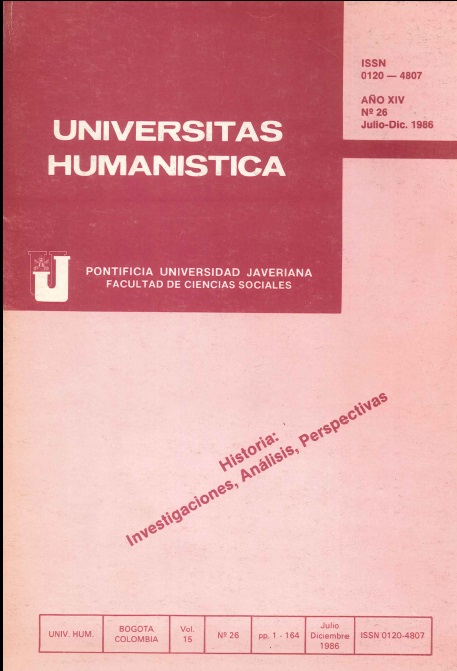Abstract
Introducción
La conmemoración centenaria de la Carta Constitucional de Colombia de 1886 y del pacto concordatario de 1887 exige a los participantes del presente Congreso el acercarse a los diversos aspectos del pensamiento del presidente Rafael Núñez con el fin de encontrar, a través de él, lo que definitivamente fue el motor de sus actuaciones cuyo influjo fue, en muchos aspectos, definitivo en nuestra Nación. Quiero dejar sentada, de antemano, la convicción que me asiste como historiador de que, ante la personalidad del gran cartagenero, es difícil lograr el equilibrio, tanto se ha escrito a favor y en contra de su dialéctica política, hasta el punto de que no es raro que el investigador se encuentre perdido, o por lo menos perplejo, ante lo imprevisto o lo contradictorio, lo genial o lo demasiado humano de su obra regeneradora. La personalidad de Rafael Núñez sintetiza una época de tremendas contradicciones ideológicas y políticas superándola en aspectos fundamentales de la vida nacional y encarna una manera de ser y de pensar que lo constituyen en antítesis de esa misma época.

This journal provides immediate open access to its content on the principle that making research freely available to the public, encourages greater global exchange of knowledge.
The journal Universitas Humanística is registered under a Creative Commons Attribution 4.0 International Public License. Thus, this work may be reproduced, distributed, and publicly shared in digital format, as long as the names of the authors and Pontificia Universidad Javeriana are acknowledged. Others are allowed to quote, adapt, transform, auto-archive, republish, and create based on this material, for any purpose (even commercial ones), provided the authorship is duly acknowledged, a link to the original work is provided, and it is specified if changes have been made. Pontificia Universidad Javeriana does not hold the rights of published works and the authors are solely responsible for the contents of their works; they keep the moral, intellectual, privacy, and publicity rights.
Approving the intervention of the work (review, copy-editing, translation, layout) and the following outreach, are granted through an use license and not through an assignment of rights. This means the journal and Pontificia Universidad Javeriana cannot be held responsible for any ethical malpractice by the authors. As a consequence of the protection granted by the use license, the journal is not required to publish recantations or modify information already published, unless the errata stems from the editorial management process. Publishing contents in this journal does not generate royalties for contributors.


